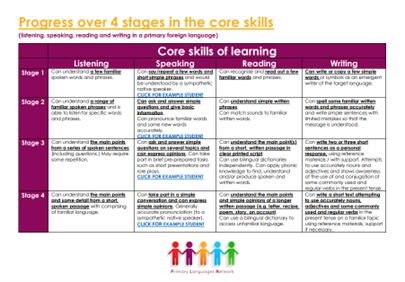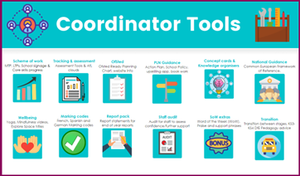Delving deeper into Primary subject coordination
Insights from a Primary MFL Consultant
I’m Kate Percival, a primary teacher and MFL consultant here at Primary Languages Network. In this blog series, I’ll be sharing top tips and inspirational ideas from the schools and coordinators I’ve been working with. Read on to find out more.
Busy Bees at Bradshaw
I recently met with MFL coordinator Laura Henshaw at Bradshaw Community Primary School in Warrington, and we had a rich discussion about her role and the direction Spanish is taking in her school. Bradshaw CPS has been a longstanding member of Primary Languages Network. Teaching assistant Laura is currently in charge of delivering Spanish using the Click2Teach scheme of work in Years 3 to 5 and a class teacher has been using Video2Teach lessons in Year 6.
Below are some of the key take-aways from our session:
Laura found it really useful to talk over PLN’s Core Skills Progress chart (saved in Coordinator Tools, Scheme of Work on the VLE). As the DfE and National Curriculum does not break down the four modalities of listening, speaking, reading and writing into end points for each of the four compulsory years of learning at KS2, PLN has developed its own which aligns with the scheme of work seamlessly.
I was proud to share the latest addition to the Core Skills Progress chart: video links to examples of speaking at the four stages! Not perfect by any means, but realistic examples of what to expect a child at the end of each stage to be able to pronounce. Remember the phrase ‘understood by a sympathetic native listener’? This is something I quote a lot both in consultancy sessions and CPD as it makes us realise that we are not after perfect pronunciation but instead an emphasis on having a good go and communication. After all, 99% of the population are ‘sympathetic listeners’ wouldn’t you agree?
Delving deeper
Laura was keen to explore more about the kinds of questions she might need to answer in a subject specific deep dive. We had a go at a mock interview and Laura’s passion shone through. The key to confidently answering these types of questions is knowing where provision is at the moment and where you’d like it to progress in the future. You don’t have to have all the ‘boxes ticked’; it is more important to know the next steps you will need to take to achieve your coordinator goals. For more top tips on preparing for a deep dive, you can look in Coordinator Tools, Ofsted section for our ‘Ofsted Ready Planning Chart’.
Looking forward
Another area we discussed was future proofing. Laura was acutely aware that should the staffing structure change for any reason, she would need to make sure that class teachers were confident with the delivery of Spanish and had enough subject knowledge to support it. We discussed delivering an update in a whole staff meeting or INSET session regarding the 12 attainment targets, four skills and three pillars of language learning and how they all work together. We also agreed it is important that class teachers are aware each week of what their class is learning and where that learning has come from and will move on to. Even if class teachers are not delivering, they need to have this awareness. This could be as simple as a conversation in the corridor to update, a quick email or post-it note left on the desk of any links to online learning that you would like the class to repeat before the next session. This led us on to talk about those short re-visits of language between formal lessons which are so crucial for recalling and embedding learning. We decided a ‘register challenge’ could be established once a day where a target language question is asked to each child during the register.
PLN’s CPD calendar
In terms of Laura’s own CPD, she felt it would be invaluable to observe a specialist teacher and coordinator deliver in another local school which PLN are supporting her with. Laura is also going to see what the PLN CPD journey can offer her both at coordinator twilights held half-termly online and upskilling sessions with Joanne Eccleshare for her colleagues.
Target language marking codes can help with workload
Finally, Laura wanted some tips on how to make marking more manageable. With responsibility for the majority of language teaching throughout the school, the piles of books can really mount up! I suggested marking more than one week’s pieces at a time which can have the effect of getting through books quicker. Also, sorting books into piles requiring similar feedback is useful. This way, you can post-it note your feedback (eg: ‘remember adjective after noun’, ‘great use of conjunctions’, ‘lower case letters for months’ etc) and verbally respond to the class at the start of the next lesson. Research shows that verbal feedback has the most impact, even better if it can be done ‘live’ (circulating whilst pupils work independently). Stamps and stickers are a great way of speeding up the process. As is a marking code. PLN has developed one for French and Spanish (saved in Coordinator Tools) which you can use or adapt. And remember, not every session will have a written outcome; sometimes the focus will be spoken or listening.
MFL consultancy sessions can run virtually or in person and can cover areas such as: starting out with primary languages in your school and putting together coordinator documentation, preparing for an MFL deep dive or looking for the next challenge. You will be given a full report of the discussion which includes working points and this can be shared with your Head teacher. Also included is a shorter catch-up session at an agreed future date where we can celebrate progress made and support with anything further.
If you would like to book Kate for a consultancy session, click the button below or contact sylvia@primarylanguages.network







